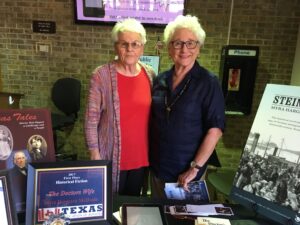Many early Texas settlers escaped a past that they preferred forgetting. Johann Friedrich Ernst not only turned his back on his past, he changed his name and became such an outstanding German Texan that he earned the title of “Father of the Immigrants.”
Born in 1796 as Christian Friedrich Dirks (or Dierks), the future Texan began a five-year service in 1814 in the Duke of Oldenburg’s regiment, rising to the rank of quartermaster sergeant and earning a medallion for participating in the campaign against Napoleon. After five years of military service, the duke made Dirks clerk at the post office. (Some accounts claim he served as head gardener for the Duke of Oldenburg.) In September 1829, apparently aware he was about to be charged by the duke with embezzling a large sum of money from the post office, Dirks took the name Ernst and fled Germany with his wife and five children.
The family settled first in New York where they operated a boarding house and became friends with Charles Fordtran a tanner from Westphalia, Germany. Fordtran and the Ernst family made plans to settle in Missouri but as they sailed up the Mississippi River they heard of the free land available in Texas and changed their destination. Arriving in Galveston on March 9, 1831, Ernst applied as a family man for a league of land (4,428 acres) from the Mexican government in the fertile rolling hills between present Houston and Austin. Fordtran, as a single man received an adjoining quarter league.
Ernst did not reach Texas prepared for a pioneer life. He did not know how to build a cabin, hated guns, and owned so little farming equipment that he was forced to use a hoe to break the soil for planting. Still, he was so pleased with his new life of political freedom, good climate, and limitless opportunities that he wrote a glowing letter to his friend in Oldenburg describing the wonderful life that Texas offered. The account received wide publicity throughout Germany, prompting many Germans to follow him to the new land. Ernst and family welcomed the newcomers to their home, even loaning money to help many of the immigrants get started.
Apparently overwhelmed by the size of his land holdings, Ernst traded 1,000 acres for a dozen milk cows. As Germans settled in the area around Ernst, they followed his lead and began growing corn, a crop and diet source totally unfamiliar to the immigrants. Ernst also introduced tobacco growing and made cigars, which he marketed in Houston, Galveston, and nearby San Felipe. He even kept records of the rainfall and temperature at his farm.
He sold pieces of his land as town-size lots to establish in 1838 the community of Industry, the first German town in Texas. The source of the town’s name came from either the industriousness of its citizens or Ernst’s cigar industry.
Despite efforts of German noblemen in the mid-1840s that brought thousands of German settlers to Texas, Industry still carries the title of “Cradle of German Settlement in Texas.” The 2010 census lists a population of 304.

I don’t know how you do it but you always captivate me with your interesting stories. Another great one. I really love reading about people and their amazing abilities.
I am always in awe of people who can start a new life in distant, sometimes unwelcoming places, with few skills to cope with the new environment. Besides confidence, it must take an enormous amount of courage and sense of adventure. Or in some cases, fear of the past catching up with oneself.
Myra, you have an endless trove of these fascinating tales. Thank you for sharing them with us.
You are welcome. I also love the tales of folks living life fully.
Thanks for reading these tales. I believe he life stories are the only interesting way to read history.
I’ve not even heard of Industry, Texas — until now. I certainly didn’t know that it predated those “other” communities like New Braunfels. Very, very interesting. I also agree that life stories are the way to tell history, and you do such a fine job of it.
Just so you know, I didn’t receive an email for this post. Had I not stopped by my Reader, I would have missed it. I checked my settings, and everything looks fine, so it may just be another little WP glitch.
Oh! I think I see. If you reposted this (I noted the January dates), WordPress doesn’t send out emails on reposts. It’s a curiosity of the system. I’m glad I found it!
Thank you for letting me know about reposting. I’ve just come in from a book signing in Bastrop and leave at six in the morning for Houston. When I get home, I must take care of correcting this post.
There were several early settlements such as Castroville, but the thousands who moved up to New Braunfels and then Fredericksburg landed on Matagorda Bay and many stayed on the coast and created the port town of Indianola. My last two books tell the story of those immigrants who developed Indianola.